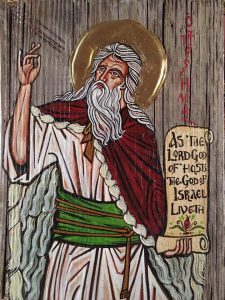 Today the Byzantine Church honors the memory of The Holy Great Prophet Elijah.
Today the Byzantine Church honors the memory of The Holy Great Prophet Elijah.
The Holy Great Prophet Elijah was one of the most important saintly figures for the Slav Peoples. In many cases, the peasant people lived in poverty and need from day to day. Elijah gave them hope, for he supplied for the needs of the widow of Zarephath in the time of drought:
“For the Lord, the God of Israel, says: The jar of flour shall not go empty, nor the jug of oil run dry, until the day when the Lord sends rain upon the earth.” (1 Kings 17:14) The farmers depended on the weather for the health of their crops, and very often for their very lives, and it was the Great-Prophet Elijah who was able to call down rain from heaven. Moreover, he was the hope of the future, having ascended into heaven in a fiery chariot, he was awaited as the forerunner of Christ in his second coming. He is for us, a model and rule of faith in God and in Jesus, his Messiah.
ELIJAH THE MAN OF ZEAL – he called down fire from heaven to consume our lawful sacrifice and to destroy the false priests of Baal. Elijah cried out to the Lord: ““I have been most zealous for the LORD, the God of hosts, but the Israelites have forsaken your covenant. They have destroyed your altars and murdered your prophets by the sword. I alone remain, and they seek to take my life.” 1 Kings 19:10 and 14) Therefore, the unfaithful king called Elijah “the disturber of Israel”(1 Kings 18:17) We pray that Elijah will disturb us, arouse us to faith, and strengthen our zeal for the Lord.
ELIJAH THE GIVER OF LIFE – When the widow of Zarephath lost her son, Elijah restored him to life. “Then he stretched himself out upon the child three times and he called out to the Lord: “Lord, my God, let the life breath return to the body of this child.” The Lord heard the prayer of Elijah; the life breath returned to the child’s body and he lived.” (1 Kings 17:21-22)
ELIJAH THE MAN OF GOD – On Mount Horeb, Elijah stood in the presence of God. He experienced the glory of God, not in the storm or the fire or the earthquake, but in the soft, gentle breeze. (1 Kings 19:11-12) We pray that there might be enough peace in our lives that we can hear God’s voice and not drown it out with the noise of our pride and unrest.
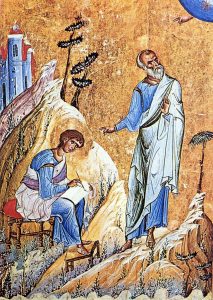 [Today] On May 8, we celebrate one of the two feasts of the Holy Apostle and Evangelist John, the brother of James. The other is on September 26, the day of his falling asleep. The fourth Gospel is attributed to John, and we can truly call it a “theo-logical,” for it witnesses most clearly to the mystery of the Incarnation, of the Word of God taking flesh in the womb of the Holy Theotokos for our salvation. It is the most sublime Gospel, and it gave John the title “Theologian.”
[Today] On May 8, we celebrate one of the two feasts of the Holy Apostle and Evangelist John, the brother of James. The other is on September 26, the day of his falling asleep. The fourth Gospel is attributed to John, and we can truly call it a “theo-logical,” for it witnesses most clearly to the mystery of the Incarnation, of the Word of God taking flesh in the womb of the Holy Theotokos for our salvation. It is the most sublime Gospel, and it gave John the title “Theologian.”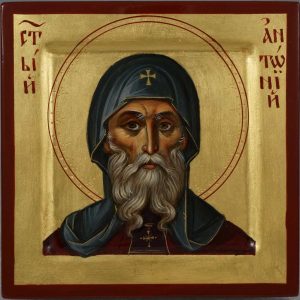 St. Anthony the Great, also called St. Anthony the Abbot (though he was a hermit) and St. Anthony of Egypt is commemorated on January 17. He is identified as the founder of desert monasticism, though the story of his life, particularly how he met St. Paul of Thebes, who preceded him into the desert, is a study of the search for Christian perfection. This story tells how he heard the gospel about the rich young man, to whom Jesus said, “If you wish to be perfect, go, sell what you have and give to the poor, and you will have treasure in heaven” (Matthew 19:21). When Anthony heard this gospel, he immediately divested himself of all his possessions and went into the desert to seek Christian perfection. This is really the calling of all Christians, as Jesus commanded, “Be perfect, just as your heavenly Father is perfect” (Matthew 5:47). For this we are baptized, that we might seek Godly perfection. St. Anthony imitated Christ when he heard this gospel, and just as Jesus went out into the desert after his baptism by John, in order to foil the wiles of Satan, so, too, does Anthony go to the desert to conquer the evil passions exploited by the temptation of the devil.
St. Anthony the Great, also called St. Anthony the Abbot (though he was a hermit) and St. Anthony of Egypt is commemorated on January 17. He is identified as the founder of desert monasticism, though the story of his life, particularly how he met St. Paul of Thebes, who preceded him into the desert, is a study of the search for Christian perfection. This story tells how he heard the gospel about the rich young man, to whom Jesus said, “If you wish to be perfect, go, sell what you have and give to the poor, and you will have treasure in heaven” (Matthew 19:21). When Anthony heard this gospel, he immediately divested himself of all his possessions and went into the desert to seek Christian perfection. This is really the calling of all Christians, as Jesus commanded, “Be perfect, just as your heavenly Father is perfect” (Matthew 5:47). For this we are baptized, that we might seek Godly perfection. St. Anthony imitated Christ when he heard this gospel, and just as Jesus went out into the desert after his baptism by John, in order to foil the wiles of Satan, so, too, does Anthony go to the desert to conquer the evil passions exploited by the temptation of the devil.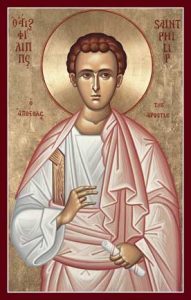 In today’s Gospel, Jesus calls Phillip, who immediately follows him. He then brings his friend Nathaniel to Jesus, “We have found the one about whom Moses wrote in the law, and also the prophets, Jesus son of Joseph, from Nazareth. (John 1:45)” This is the feast to begin our Christmas preparation. Phillip leads us to the one true Messiah, the child born of Mary in Bethlehem. The child “who, though he was in the form of God, did not rega
In today’s Gospel, Jesus calls Phillip, who immediately follows him. He then brings his friend Nathaniel to Jesus, “We have found the one about whom Moses wrote in the law, and also the prophets, Jesus son of Joseph, from Nazareth. (John 1:45)” This is the feast to begin our Christmas preparation. Phillip leads us to the one true Messiah, the child born of Mary in Bethlehem. The child “who, though he was in the form of God, did not rega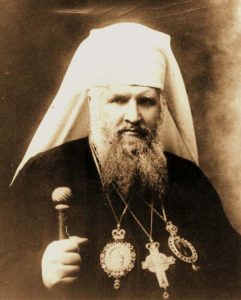 Remembering Metropolitan Andriy Sheptytsky, OSBM, today.
Remembering Metropolitan Andriy Sheptytsky, OSBM, today.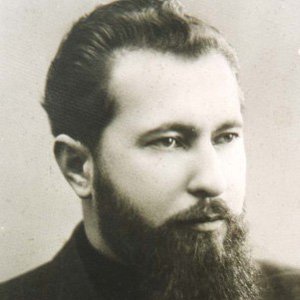 Blessed Theodore Romzha was bishop of the Ruthenian Catholic Eparchy of Mukachevo from 1944 to 1947.
Blessed Theodore Romzha was bishop of the Ruthenian Catholic Eparchy of Mukachevo from 1944 to 1947.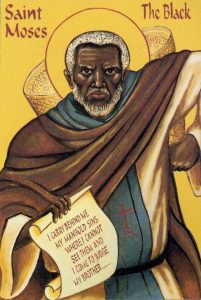 On our liturgical calendar today, the Church remembers a saint many have not heard of, Moses of Skete in Egypt, sometimes called “Moses the black” or “Moses the Ethiopian.”
On our liturgical calendar today, the Church remembers a saint many have not heard of, Moses of Skete in Egypt, sometimes called “Moses the black” or “Moses the Ethiopian.”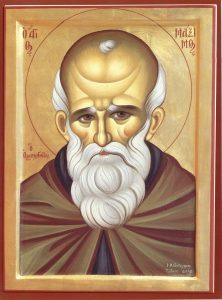 August 13 is the feast-day of St. Maximus. Because it is also the leave-taking of the Feast of the Transfiguration of our Lord, the liturgical commemoration is transferred to Saturday. Today Maximus is considered one of the “pillars of Orthodoxy,” and Fr. John Meyendorff called him “the father of Byzantine theology.” His accomplishments are many – he was martyred because of his faithful defense of the incarnation of our Lord, that he was truly human in every way (except sin) and had a human will. He had to live many years in exile.
August 13 is the feast-day of St. Maximus. Because it is also the leave-taking of the Feast of the Transfiguration of our Lord, the liturgical commemoration is transferred to Saturday. Today Maximus is considered one of the “pillars of Orthodoxy,” and Fr. John Meyendorff called him “the father of Byzantine theology.” His accomplishments are many – he was martyred because of his faithful defense of the incarnation of our Lord, that he was truly human in every way (except sin) and had a human will. He had to live many years in exile.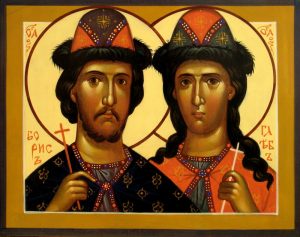 Today, the Byzantine Church commemorates the holy protomartyrs of the Kievan-Rus’, Boris and Gleb, in baptism named Roman and David. They sit in opposition to the common approach to leadership and power among people.
Today, the Byzantine Church commemorates the holy protomartyrs of the Kievan-Rus’, Boris and Gleb, in baptism named Roman and David. They sit in opposition to the common approach to leadership and power among people.